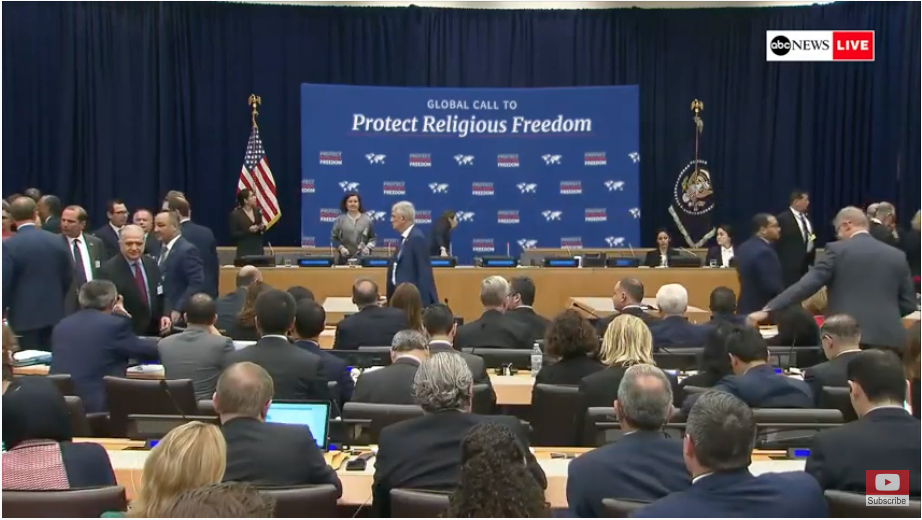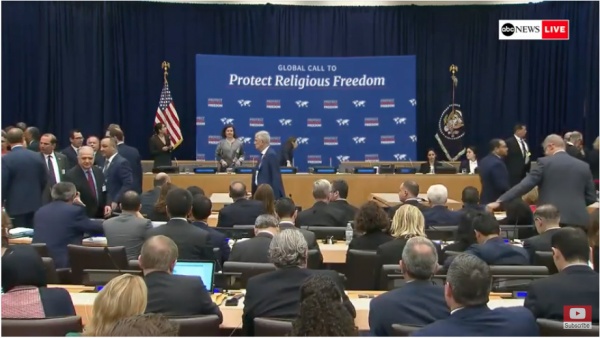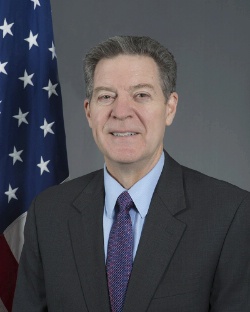
Here We Are Again: Confronting the Rise of Religious Persecution
- By Sam Field --
- 26 Sep 2019 --
 On Sept. 23rd, President Trump convened a meeting on religious freedom at the UN, surrounded by survivors of religious persecution from around the globe, civil society leaders, religious leaders, U.S. business executives, U.S. administration officials, members of the U.S. Commission on International Religious Freedom (USCIRF), and members of the faith community. Over 130 UN Heads of State and Delegations, as well as UN Secretary Gutierrez, attended the event.
On Sept. 23rd, President Trump convened a meeting on religious freedom at the UN, surrounded by survivors of religious persecution from around the globe, civil society leaders, religious leaders, U.S. business executives, U.S. administration officials, members of the U.S. Commission on International Religious Freedom (USCIRF), and members of the faith community. Over 130 UN Heads of State and Delegations, as well as UN Secretary Gutierrez, attended the event.
“The United States was founded on the principle that rights do not come from government – they come from God,” began President Trump as he addressed the Conference. “…We ask the governments of the world to honor the eternal right of every person to follow their conscience, live by their faith, and give glory to God. The United States has a vital role in this critical mission.”
Vice-President Pence outlined many of the recent outrages against freedom of religion, citing Iran’s persecution of Christians, Sunnis, Bahai’i and Jews; ISIS’ genocide of Christians and Yazidis, the Chinese Communist Party’s arrest of Christian pastors, demolition of churches and imprisoning of more than a million Uighurs.
“The regime of Daniel Ortega,” said Pence, “is virtually waging war on the Catholic Church in Nicaragua. And in Venezuela, the dictator Nicolás Maduro uses anti-hate laws to prosecute clergy, even as his media cronies spread anti-Semitism by trivializing the Holocaust.” Pence went on to list mass shootings in houses of worship in Pittsburgh, New Zealand and Sri Lanka, saying such attacks “strike at the heart of everything free peoples hold sacred.”
“After so many years of suffering with the Holocaust,” said Holocaust survivor and Conference presenter Irene Weiss, “I thought there would never again be discrimination against religion and people who are different, but here we are again.”
Weiss, sent at age 13 to Auschwitz, survived the death camp and while the Holocaust serves as a reminder of the depths of depravity to which some sectors of humanity can sink, the lesson has not been learned, the suppression goes on, and as pointed out by Sam Brownback, the U.S. Ambassador at Large for International Religious Freedom, religious persecution is increasing around the world. Even though the UN Charter and many countries’ constitutions assure religious freedom, more than 80 percent of the world’s population live in a religiously restrictive environment with punishments for religious practice that range all the way to the death penalty.
Meriam Ibrahim, for example, another speaker at the Conference, was imprisoned in Sudan and sentenced to death for the crime of apostasy because she married a Christian man. She gave birth in prison and only an international outcry led to her release and eventual asylum in the United States.
UN Secretary General António Guterres, addressing the Conference, said that “There is richness and strength in diversity; it is never a threat … All major religions espouse mutual respect and peaceful coexistence in a spirit of shared humanity. And our shared foundational text, the Universal Declaration of Human Rights, affirms everyone’s right to freedom of thought, conscience and religion.”
 While the Administration’s Ambassador Brownback said that he has more staff devoted to religious freedom than all other countries combined, what can he and his office actually do to decrease religious persecution worldwide? Perhaps highlighting international agreements assuring religious freedom is a start. In addition, President Trump announced he would dedicate $25 million to protect religious sites and houses of worship across the world and also announced the creation of a coalition of top business leaders to help protect religious freedom in the workplace. Prejudice, discrimination and bigotry reaches deeply into many societies and individuals, and workplace discrimination – the ability to compete fairly in the marketplace and earn a living – has become an issue as detailed in a U.S. Equal Employment Opportunity Commission report.
While the Administration’s Ambassador Brownback said that he has more staff devoted to religious freedom than all other countries combined, what can he and his office actually do to decrease religious persecution worldwide? Perhaps highlighting international agreements assuring religious freedom is a start. In addition, President Trump announced he would dedicate $25 million to protect religious sites and houses of worship across the world and also announced the creation of a coalition of top business leaders to help protect religious freedom in the workplace. Prejudice, discrimination and bigotry reaches deeply into many societies and individuals, and workplace discrimination – the ability to compete fairly in the marketplace and earn a living – has become an issue as detailed in a U.S. Equal Employment Opportunity Commission report.
Convincing the global community of the value of religious freedom and to accept and implement policies and laws to protect it could be a challenge, as religion is a very personal subject. Must a Catholic hospital provide abortions? Can a Christian bakery be forced to make a wedding cake for a same-sex couple? Must a business allow Muslim employees to wear head scarves and pray? Can Sikh motorcyclists be forced to remove their turbans and wear helmets? Can a Muslim truck driver refuse to transport alcoholic beverages? Must Christian Scientists and Dutch Reformed Church members allow their children to be vaccinated? Can Jehovah’s Witnesses refuse a blood transfusion?
These and other issues are working their way through the courts, but it will take mutual respect and understanding, not lawyers, to reconcile these various rights and restrictions.



















